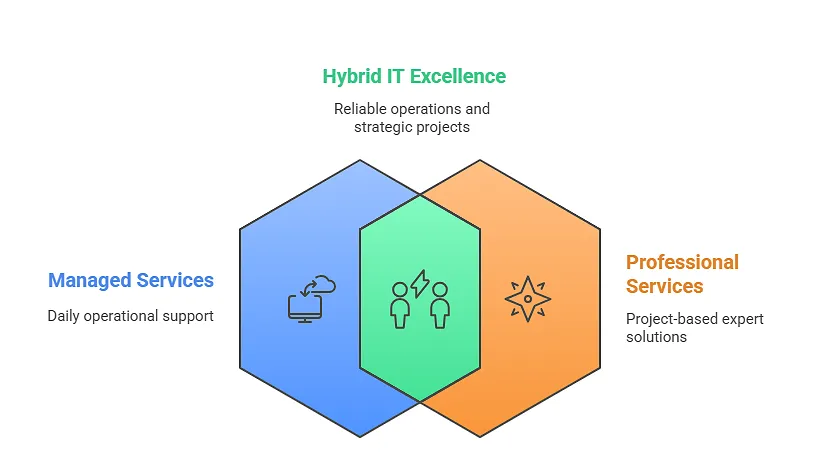Businesses often struggle to decide between managed services and professional services. Many try to handle IT internally, but this causes downtime and lost revenue.
Businesses lose an average of 15.3 minutes of productivity per employee each day due to IT downtime. Selecting the right service can mitigate this risk and enhance operations.
| “The true value of IT support lies in its ability to remove friction. When technology stops being a distraction, teams can redirect their energy toward what drives the business forward.” – Bradd Konert, President of Gamma Tech Services |
This blog will guide you through comparing, selecting, and sometimes combining both managed services and professional services to ensure your business thrives with technology.
Why You Should Compare Managed Services and Professional Services
The choice of whether to adopt managed services or professional services affects more than how your IT is cared for; it also affects IT costs, operational efficiency, and risk mitigation.
Businesses without IT teams often face downtime, delayed projects, and security issues. Enterprises may lack the expertise they need for larger IT projects, such as digital upgrades or cloud migrations.
How do managed services vs professional services impact these factors?
- Cost efficiency: Managed services offer predictable monthly pricing. Professional services are one-off projects.
- Scalability: Managed services adapt to growth, professional services scale through defined projects.
- Internal IT maturity: Experienced teams may need professional services; less experienced teams benefit from managed services.
Choosing the right model ensures technology supports your business goals rather than hindering growth.
Choose Managed Services for Long-Term IT Success!
Move past project-only fixes. Managed services keep your IT running smoothly, securely, and ready for growth every day
Learn MoreWhat Managed Services Mean for Businesses
Managed services offer ongoing IT support, ensuring your systems run efficiently every day. These services are subscription-based and cover the operational aspects of technology.
Key features include:
- Proactive monitoring: Managed services monitor networks and systems 24/7 to detect issues before they affect your operations. This reduces downtime and increases productivity.
- Ongoing support: You can access help whenever a problem arises, including remote troubleshooting and on-site visits when needed.
- Predictable costs: Monthly subscriptions allow you to budget IT expenses easily without surprises. 46% of companies have been able to cut IT costs by over 25% through managed service provider partnerships.
For small businesses, healthcare practices, or construction companies, managed services reduce operational headaches. They help teams work on their actual tasks and goals, not on managing technology.
For example, healthcare providers must comply with HIPAA, and managed services help maintain secure networks.
Construction firms benefit from reliable cloud and data solutions. Managed services take responsibility for day-to-day operations, letting you focus on core business tasks and preparing you for long-term growth.
What Professional Services Deliver for Companies
Professional services offer project-based expertise for specific, short-term needs such as system upgrades, migrations, or compliance audits.
With the global IT professional services market projected to grow from $870.05 billion in 2023 to $1.6 trillion by 2030, it’s clear that organizations continue to invest in specialized solutions. However, choosing between managed and professional services depends on your long-term strategy, internal capabilities, and the nature of your IT challenges.
Professional services typically include:
- Consulting: Experts advise on system design, software selection, or technology strategy to avoid costly mistakes.
- Deployment: Implementation of new software, cloud migration, or infrastructure upgrades is completed efficiently.
- Training and knowledge transfer: Your team learns to manage the new technology independently after the project.
Businesses often choose professional services for tasks like migrating data to the cloud, installing enterprise software, or executing complex rollouts.
These services are ideal if you have a skilled internal IT team but need specialized support to complete a project on time and within budget.
| Learn More About How You Can Set Your IT Team Up For Success How to Choose a Managed IT Services Provider Cord Cutting (Should you make this switch?) How Much Storage Should I Have For My NVR? |
A Side-by-Side Look at Managed Services and Professional Services
Comparing managed services with professional services helps clarify their value. This table highlights that your choice depends on whether your focus is on long-term operational stability or targeted, project-specific outcomes.
Both have strategic roles depending on your business needs.
| Feature | Managed Services | Professional Services |
| Duration | Ongoing | Project-based |
| Pricing | Subscription | One-time |
| Scope | Broad IT needs | Defined outcomes |
| Ideal for | SMBs, ongoing needs | Projects, upgrades |
Key Factors When Choosing Between Managed Services and Professional Services
Several factors influence the right choice:
- Budget: Managed services involve predictable, recurring costs. Professional services are one-off investments for specific projects.
- IT maturity: Companies with limited IT staff benefit from managed services. Skilled teams can handle professional service projects more effectively.
- Project duration: Managed services suit ongoing needs, while professional services fit defined, time-bound initiatives.
- Risk and compliance: Businesses with compliance requirements or sensitive data may need managed services for consistent protection.
When you weigh these factors, you can determine which model aligns best with your resources, objectives, and operational requirements.
Where Managed and Professional Services Work Together

Some businesses benefit from combining managed services and professional services. Managed services maintain daily operations, while professional services handle specific projects like migrations or upgrades.
For example, a growing company may rely on managed services to ensure network uptime while using professional services to implement a new ERP system. This hybrid approach strengthens IT resilience and reduces the risk of downtime.
Businesses gain the best of both worlds: predictable support and expert guidance for targeted initiatives. Using these services together ensures technology drives business growth efficiently.
Real Business Scenarios: Comparing Managed Services vs Professional Services
Practical examples show how to choose between managed services and professional services based on your business context:
- Healthcare practice: Needs consistent compliance monitoring. Managed services provide ongoing security, data backups, and proactive updates.
- Construction company: Expanding operations require cloud migration. Professional services handle the rollout, training, and integration of systems.
- Growing business: Combines both. Managed services manage daily operations, while professional services oversee specific projects like software upgrades.
Each scenario highlights that your choice depends on current needs, IT expertise, and long-term business objectives.
How to Select the Right IT Support Provider
When choosing a provider, focus on reputation, experience, and certifications. Gamma Tech Services has over two decades of experience in IT, is a Dell Premier Partner, and has 200+ five-star Google reviews.
Ask clear questions before signing a contract:
- What services are included in ongoing support or project scope?
- What are the response times and SLAs?
- Are guarantees offered, such as response within 30 minutes or completion timelines?
These questions ensure your partner can deliver what you need and give you confidence in the service quality. Choosing the right IT partner simplifies operations and strengthens your technology foundation.
Critical IT Considerations for Managed Services and Professional Services
Beyond cost, duration, and scope, consider scalability, technology compatibility, and internal training needs. These often determine how well services align with your growth plan.
This table summarizes how each model addresses critical IT considerations differently, helping you make an informed decision.
| Factor | Managed Services | Professional Services |
| Scalability | Supports business growth continuously | Supports growth through project-based interventions |
| Training | Limited internal training; ongoing guidance | Knowledge transfer to the internal team after completion |
| Integration | Maintains existing systems | Implements new systems or upgrades |
| Monitoring | 24/7 monitoring and issue prevention | Monitored during project phases only |
Partner with Gamma Tech Services for Reliable Managed IT Support
Choosing between managed services vs professional services is not always a simple either-or decision. Both approaches serve unique needs, and combining them can offer stronger results for your business. Assess your IT maturity, growth goals, and internal expertise before deciding.
Gamma Tech Services is a leading provider of IT support for businesses in SWFL. With over 20 years in service and 94 companies supported, we guarantee responsive, expert IT solutions.
| Partner With a Reliable Managed Services Provider | |
| Naples | Fort Myers |
Contact us today to schedule a consultation and find out how our services can optimize your technology operations.



